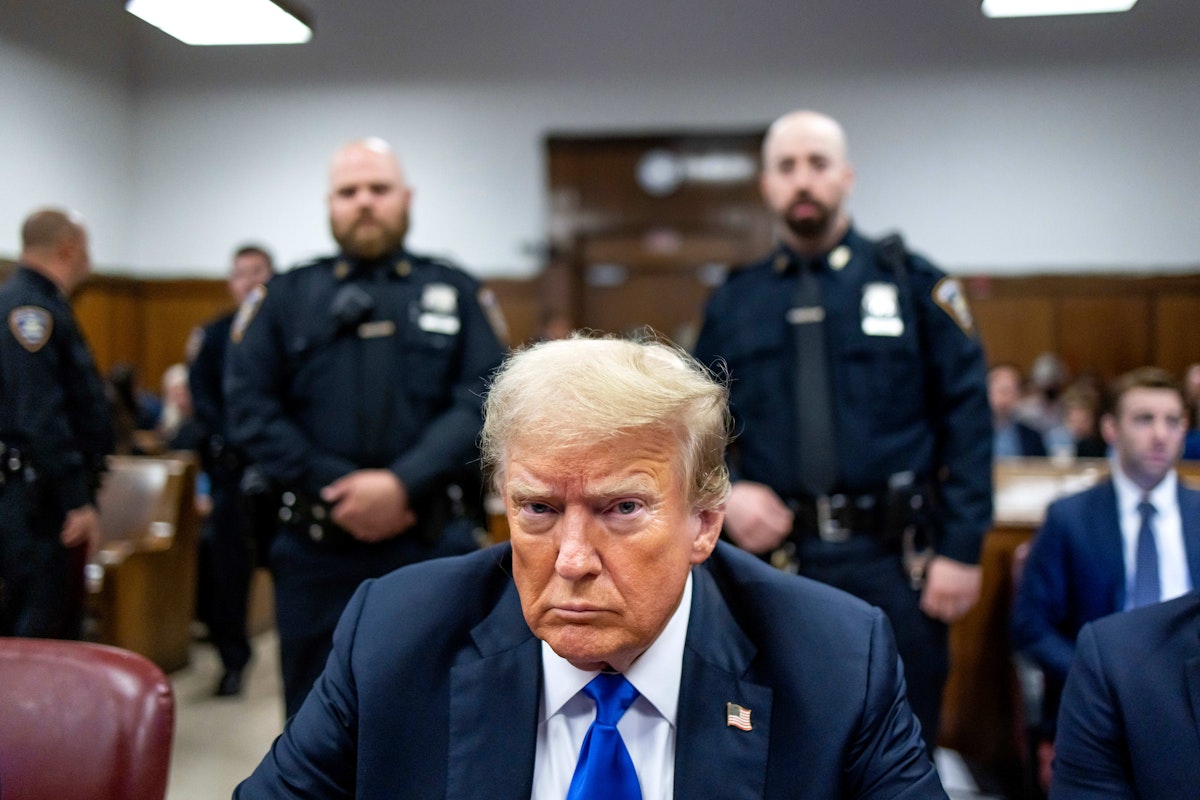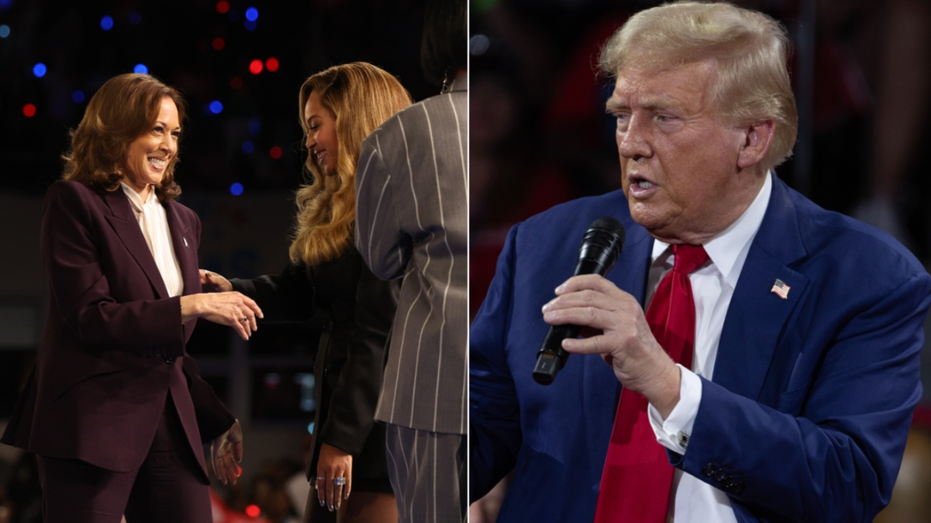Trump’s Historic Conviction Is a Hollow Victory
Donald Trump, the human manifestation of the rotten core of American exceptionalism, has once again done something no other politician has done. Just as he became the first person with zero political or military experience to be elected president and then the first president to be impeached twice, he is now the first former president to be convicted of a crime—in this case, 34 felonies related to hush-money payments made to adult film actress Stormy Daniels before the 2016 election. This is, objectively, a historic moment: A former president is being held accountable for a crime that no one really denies that he committed (though whether that crime rises to a felony is another matter altogether, and one that will likely be the focus of an appeal). He is, moreover, the Republican Party’s presidential nominee and the clear front-runner to win the 2024 election, which means there is a more than reasonable possibility that, in just over half a year’s time, the president of the United States will be a convicted felon. In theory, it is also a moment in which Trump, who has flouted the law for decades, is finally facing consequences for his brazen criminality. Ever since he rose to prominence in the corrupt and sleazy world of New York real estate, Trump has lived a life of flagrant dishonesty and deception. He was elected president in spite of—or perhaps because of—this blatant disregard for American institutions. Now those institutions are striking back. It’s unlikely that, when he’s sentenced for his crimes, Trump will be imprisoned. But he will be a felon—and may even be unable to cast a ballot for himself when voters head to the polls in November. And yet, Trump’s conviction nevertheless feels deflating, even a little disappointing. All of the investigations, grand juries, and indictments have culminated in this? A slap on the wrist?Not so long ago, it seemed that this trial, in New York, would be the grace note to several more serious ones involving, among other things, the willful retention of classified national security documents and Trump’s role in the January 6 insurrection. Now those trials are stalled and unlikely to move forward anytime soon; instead there is a yawning void, with little to fill it, between now and the election in five months. Far from being a seismic moment in which Trump finally faces accountability for a lifetime spent flouting the law, this conviction feels more like a fleeting and rather slight triumph. The hope, not so long ago, was that a conviction would puncture Trump’s stubborn lead in the polls—and, more importantly, his well-cultivated, if inaccurate, aura of invulnerability. There exists a great deal of polling suggesting that voters could turn on the former president if he were to become a convicted felon. A Marquette University survey found, for instance, that his lead was six points if he were found not guilty—but that Biden would lead by four points were the Manhattan jury to find Trump guilty. I, like my colleague Walter Shapiro, have long been skeptical that a guilty verdict would lead to a dramatic shift in the polls. There has, from the very beginning of Trump’s political career, long been an assumption—or at least an abiding hope—that he would cross some unimaginable line and most voters would finally turn on him. Trump’s attacks on John McCain, the Muslim ban, his demonization of a Gold Star family, the Access Hollywood tape, Michael Flynn, his first impeachment (for pressuring a foreign government to launch a phony investigation of a political rival), his disastrous handling of the Covid-19 pandemic, his fascistic response to racial justice protests, his attempted overturning of a lawful and legitimate election, and his second impeachment for inciting the January 6 insurrection—all were foisted as moments of reckoning. That reckoning never came. It is hard to imagine that a conviction—even a felony conviction—on paying hush money to an adult film actress would change that. Especially since that payment (and the related affair) have been known for years. Yes, the broad facts of Trump’s other trials are also familiar to voters. They know about January 6. They know that he retained classified information after he left the White House. But those cases both strike at larger vulnerabilities for Trump. They get at his wild and dangerous irresponsibility. They get at his contempt for the rule of law. They get at his contempt for American democracy itself. A trial, taking place over several weeks, would focus attention on those qualities in a way that the Biden campaign has struggled to do for most of this year. The hush-money trial gets at some of that, sure. But it is decidedly lower stakes. Was Trump trying to manipulate the election? Was he trying to hide an affair from his wife? Was it a little bit of column A and column B? We’ll never know precisely. What is clear is that Trump is crooked and more than a little sleazy—two things that have been part of his self-ima

Donald Trump, the human manifestation of the rotten core of American exceptionalism, has once again done something no other politician has done. Just as he became the first person with zero political or military experience to be elected president and then the first president to be impeached twice, he is now the first former president to be convicted of a crime—in this case, 34 felonies related to hush-money payments made to adult film actress Stormy Daniels before the 2016 election.
This is, objectively, a historic moment: A former president is being held accountable for a crime that no one really denies that he committed (though whether that crime rises to a felony is another matter altogether, and one that will likely be the focus of an appeal). He is, moreover, the Republican Party’s presidential nominee and the clear front-runner to win the 2024 election, which means there is a more than reasonable possibility that, in just over half a year’s time, the president of the United States will be a convicted felon.
In theory, it is also a moment in which Trump, who has flouted the law for decades, is finally facing consequences for his brazen criminality. Ever since he rose to prominence in the corrupt and sleazy world of New York real estate, Trump has lived a life of flagrant dishonesty and deception. He was elected president in spite of—or perhaps because of—this blatant disregard for American institutions. Now those institutions are striking back. It’s unlikely that, when he’s sentenced for his crimes, Trump will be imprisoned. But he will be a felon—and may even be unable to cast a ballot for himself when voters head to the polls in November.
And yet, Trump’s conviction nevertheless feels deflating, even a little disappointing. All of the investigations, grand juries, and indictments have culminated in this? A slap on the wrist?
Not so long ago, it seemed that this trial, in New York, would be the grace note to several more serious ones involving, among other things, the willful retention of classified national security documents and Trump’s role in the January 6 insurrection. Now those trials are stalled and unlikely to move forward anytime soon; instead there is a yawning void, with little to fill it, between now and the election in five months. Far from being a seismic moment in which Trump finally faces accountability for a lifetime spent flouting the law, this conviction feels more like a fleeting and rather slight triumph.
The hope, not so long ago, was that a conviction would puncture Trump’s stubborn lead in the polls—and, more importantly, his well-cultivated, if inaccurate, aura of invulnerability. There exists a great deal of polling suggesting that voters could turn on the former president if he were to become a convicted felon. A Marquette University survey found, for instance, that his lead was six points if he were found not guilty—but that Biden would lead by four points were the Manhattan jury to find Trump guilty.
I, like my colleague Walter Shapiro, have long been skeptical that a guilty verdict would lead to a dramatic shift in the polls. There has, from the very beginning of Trump’s political career, long been an assumption—or at least an abiding hope—that he would cross some unimaginable line and most voters would finally turn on him. Trump’s attacks on John McCain, the Muslim ban, his demonization of a Gold Star family, the Access Hollywood tape, Michael Flynn, his first impeachment (for pressuring a foreign government to launch a phony investigation of a political rival), his disastrous handling of the Covid-19 pandemic, his fascistic response to racial justice protests, his attempted overturning of a lawful and legitimate election, and his second impeachment for inciting the January 6 insurrection—all were foisted as moments of reckoning. That reckoning never came. It is hard to imagine that a conviction—even a felony conviction—on paying hush money to an adult film actress would change that. Especially since that payment (and the related affair) have been known for years.
Yes, the broad facts of Trump’s other trials are also familiar to voters. They know about January 6. They know that he retained classified information after he left the White House. But those cases both strike at larger vulnerabilities for Trump. They get at his wild and dangerous irresponsibility. They get at his contempt for the rule of law. They get at his contempt for American democracy itself. A trial, taking place over several weeks, would focus attention on those qualities in a way that the Biden campaign has struggled to do for most of this year.
The hush-money trial gets at some of that, sure. But it is decidedly lower stakes. Was Trump trying to manipulate the election? Was he trying to hide an affair from his wife? Was it a little bit of column A and column B? We’ll never know precisely. What is clear is that Trump is crooked and more than a little sleazy—two things that have been part of his self-image, to varying degrees, since he first became a public figure more than 40 years ago. The crime hovering above the trial—manipulating the result of the 2016 election by withholding information—is serious, to be sure. But Trump has been convicted for falsifying business records, not exactly the stuff of coups or national security.
I may be very wrong. It’s possible that this will be the thing that undoes Trump—that, ultimately, voters can stomach anything except voting for a convicted felon. But even if that is the case, it doesn’t change the larger problem for Biden and those seeking to ensure that Trump doesn’t return to power, which he will undoubtedly wield as a despot. In many ways, the last six weeks have been a distraction from the core argument against Trump—against the danger that he poses to the country, its institutions, and democracy itself. Yes, he is a criminal. But he always has been. The work now is to make the case that he’s a criminal on a much larger scale, someone bent on undermining the country for his own benefit—including doing everything in his power to prevent those more damaging cases from ever going to trial.



